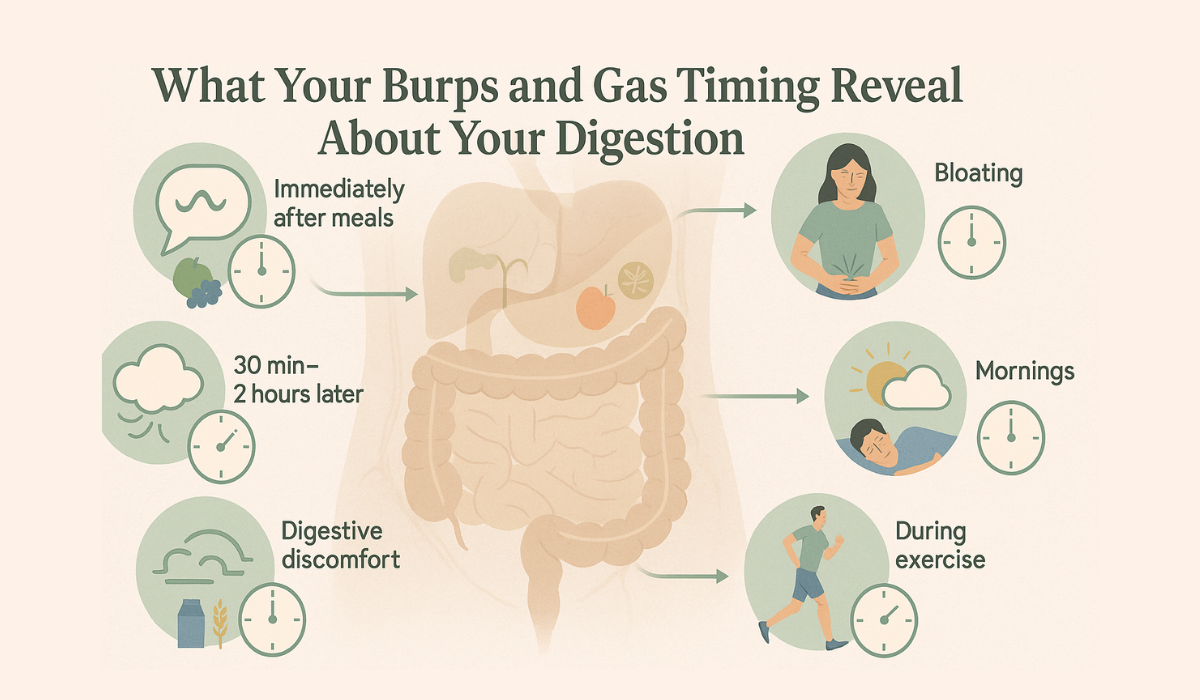Burps, gas, and bloating aren’t just minor annoyances—they are signals from your digestive system. Understanding when these symptoms occur can reveal underlying issues such as enzyme insufficiency, delayed gastric emptying, food intolerance, or reflux. More importantly, with the right remedies, these signals can guide you to improve digestion naturally and effectively.
1. Burping Immediately After Eating (Within 10–15 Minutes)
What it indicates:
-
Low stomach acid
-
Insufficient digestive enzymes for proteins or carbohydrates
Practical remedies:
-
Add a small piece of ginger or sip warm ginger water before meals to stimulate digestion.
-
Include fermented foods like a small portion of yogurt or idli/dosa batter to boost natural enzymes.
-
Meal tweak: Avoid combining high-protein foods with large quantities of starch in the same meal if you’re sensitive.
-
Tip: Eat slowly and pause mid-bite to allow initial enzyme action.
2. Delayed Burping or Bloating (1–2 Hours After Eating)
What it indicates:
-
Delayed gastric emptying due to high-fat meals, stress, or slowly digesting fiber
Practical remedies:
-
Small, balanced meals: Limit heavy fats and large portions.
-
Digestive spice mix: Include cumin, fennel, or asafoetida while cooking to aid motility.
-
Posture hack: Gentle 10-minute walk after meals or sitting upright helps the stomach empty faster.
-
Stress management: Deep breathing exercises after meals to reduce delayed digestion caused by stress.
3. Gas Within 30 Minutes of Eating
What it indicates:
-
Rapid fermentation of simple carbohydrates in the stomach or small intestine
Practical remedies:
-
Food prep: Soak beans, lentils, and legumes overnight to reduce gas-causing compounds.
-
Meal combinations: Avoid high-sugar fruit with starchy meals; eat fruits separately.
-
Herbal help: Fennel seeds or carom seeds chewed after meals reduce early gas formation.
4. Gas 2–4 Hours Post-Meal
What it indicates:
-
Large intestine fermentation due to malabsorption or food intolerance (lactose, gluten, high-FODMAP foods)
Practical remedies:
-
Elimination approach: Remove one potential trigger at a time (e.g., dairy or wheat) for 1–2 weeks.
-
Probiotic support: Include yogurt or fermented foods to balance gut bacteria.
-
Enzyme supplementation: Consider lactase enzyme if lactose-sensitive (under professional guidance).
-
Food spacing: Avoid combining multiple gas-forming foods in one meal.
5. Gas or Discomfort While Lying Down
What it indicates:
-
Delayed stomach emptying
-
Reflux or sensitivity to high-fat/spicy foods
Practical remedies:
-
Meal timing: Finish dinner at least 2–3 hours before lying down.
-
Elevate upper body: Slight incline while sleeping reduces reflux.
-
Soothing teas: Sip warm chamomile or peppermint tea post-dinner.
-
Avoid triggers: Minimize fried, spicy, or greasy foods in evening meals.
6. Symptoms First Thing in the Morning
What it indicates:
-
Overnight fermentation or slow digestion due to previous night’s heavy meal or low enzymes
Practical remedies:
-
Warm start: Begin the day with warm water, lemon, or ginger tea to stimulate digestion.
-
Light breakfast: Opt for easily digestible foods like poha, upma, or soaked oats.
-
Avoid heavy late-night meals: Give the digestive system time to clear before sleep.
7. Gas or Discomfort During Exercise
What it indicates:
-
Eating too close to workouts
-
Sensitivity to certain carbohydrates or fiber-rich foods
-
Swallowing air while drinking water
Practical remedies:
-
Meal timing: Eat at least 1.5–2 hours before exercising.
-
Pre-workout snack: Small, low-fiber, easily digestible foods like banana or soaked nuts.
-
Hydration strategy: Sip water slowly instead of gulping.
-
Avoid carbonated drinks before workouts.
8. Additional Expert Tips for Improving Digestion
-
Track symptoms: Use a journal to link burps, gas, or bloating with meals, portions, and timing.
-
Mindful eating rituals: Focus on food, avoid distractions, and chew appropriately.
-
Digestive aids: Include fennel, cumin, ginger, or asafoetida in cooking.
-
Support gut health: Incorporate fermented foods and probiotics gradually.
-
Stress management: Meditation, deep breathing, or light walks improve gut motility.
-
Hydration: Drink warm or room-temperature water throughout the day, not cold water with meals.
Key Takeaways
-
Burps, gas, and digestive discomfort are communication signals from your digestive system.
-
Timing is critical—symptoms during meals, post-meal, lying down, mornings, or exercise can reveal specific issues.
-
Implementing targeted remedies like meal adjustments, herbal aids, enzyme support, and timing hacks can optimize digestion naturally.
Call-to-Action:
Observe your digestion carefully this week. Track symptoms, apply the remedies that suit you, and consult a certified nutritionist for persistent discomfort or suspected food intolerances. Your body is sending signals—listen and act on them.



